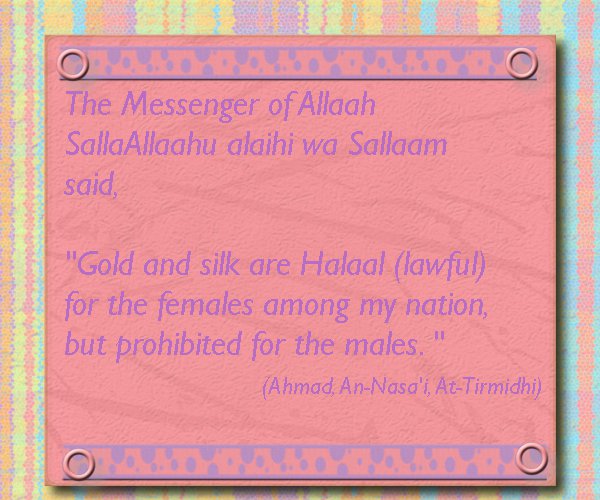Chapter 17 Clothing
547. Abu ‘Amir al-Ash’ari

: narrated, ‘The Messenger of Allah :saws : said, « There will be among my followers, some people who will make Halaal (lawful) a woman’s vagina (i.e. adultery) and silk (which is forbidden for men).” Related by Abu Dawud and al-Bukhari.
548. Abu Hudhaifah Ibn Al-Yaman

: narrated, “The Messenger of Allah

prohibited us from eating and drinking from gold and silver vessels.He also forbade us from wearing clothes made of silk or brocade (i.e. the men but it is lawful for women) to to sit on them.’ Related by Al-Bukhari and Muslim.)
549. ‘Umar

: narrated, ‘The Messenger of Allah

prohibited (men) from wearing silk, except for the size of two, three or four fingers’. {173} Agreed upon and the wording is from Muslim.
173. It is only permissible for men to wear a garment embroidered with silk thread, the maximum size of such a design should not exceeed the size f four fingers, or that the whole garment could include a piece of silk not exceeding that size.550. Anas

: narrated, ‘The Messenger of Allah

gave permission to ‘AbdurRahman bin ‘Auf and Az-Zubair to sear silk clothing on a journey, as they were suffering from a skin irritation.’ Agreed upon.
551. ‘Ali

: narrated, ‘The Messenger of Allah

sent me a garment striped with silk (or made of pure silk, which is more likely) so I went out wearing it. I saw the Prophet

and he looked very angry (when seeing me wearing it), so I cut it up (and divided it) among my female (relatives).’ {174} Agreed upon and the wording is from Muslim.
{174} In another narration, he divided it into three head covers, which he gave to the three Fatimas (i.e. His wife Fatimah the daughter of the Prophet  his mother Fatimah bint Asad and Fatimah bint Hamzah, his cousin.
his mother Fatimah bint Asad and Fatimah bint Hamzah, his cousin.552. Abu Musa

: narrated that the Messenger of Allah

said, “Gold and silk are halaal (lawful) for the females among my nation, but prohibited for the males.” Related by Ahmad, An-Nasa’I and At-Tirmidhi.
553. ‘Imran bin Husain

: narrated that the Messenger of Allah

said, “When Allah bestows one of his favors upon a slave, He likes to see its effect on him.” {175} Related by Al-Baihaqi.
{175} This means that one should eat and wear clothes, which reflect his average income, as this is a way of acknowledging grace of Allah upon him and also if a poor person sees him looking respectable, he would be encouraged to ask him for help. (Imam as-San’ani Subul as-Salam; the interpretation of Bulugh al-Maram).554.’Ali

: narrated, “The Messenger of Allah

prohibited (men from) wearing Qassei ( a kind of fabric made of silk or striped with silk, {176} which is brought from Egypt and Syria) or any clothing dyed with saffron.’ Related by Muslim.
{176} It is definitely prohibited if the percentage of silk is very high, otherwise it is disliked to wear it if there is a small amount.554. ‘Abdullah bin ‘Amro :radiyallahunah: narrated, “The Messenger of Allah

saw me wearing two garments dyed with saffron. Thereupon he said to me, “Has your mother ordered you to do so?”{177} Related by Muslim.
{177}This comment from the Prophet  indicates that dying clothes with saffron is absolutely prohibited for men, and he mentioned the mother because it is usual for women to use it to decorate their clothing. This is also supported by the rest of the narration in Muslim, in which the Prophet
indicates that dying clothes with saffron is absolutely prohibited for men, and he mentioned the mother because it is usual for women to use it to decorate their clothing. This is also supported by the rest of the narration in Muslim, in which the Prophet  commanded him to burn the two garments when ‘Amro asked him if he should wash them.
commanded him to burn the two garments when ‘Amro asked him if he should wash them.556. Asma’ bint Abi Bakr

: reported that she brought out the cloak of the Prophet

and it had a brocade fringe on the collar, sleeves, and the front and back openings. Related by Abu Dawud, and Muslim who added, ‘Aishah

: had it until she died, then I took it. The Prophet

used to wear it, and now we wash it and use it (or the washing) for the sick, seeking a cure (by virtue of its blessings as it touched the body of the Prophet

).’ Al-Bukhari added to the above narration in his book ‘Al-Adab al-Mufrad’, ‘He

used to wear it for (meeting with) delegations and for the Friday prayer.’









 Please check our
Please check our 




 : narrated, ‘The Messenger of Allah :saws : said, « There will be among my followers, some people who will make Halaal (lawful) a woman’s vagina (i.e. adultery) and silk (which is forbidden for men).” Related by Abu Dawud and al-Bukhari.
: narrated, ‘The Messenger of Allah :saws : said, « There will be among my followers, some people who will make Halaal (lawful) a woman’s vagina (i.e. adultery) and silk (which is forbidden for men).” Related by Abu Dawud and al-Bukhari.
 prohibited us from eating and drinking from gold and silver vessels.He also forbade us from wearing clothes made of silk or brocade (i.e. the men but it is lawful for women) to to sit on them.’ Related by Al-Bukhari and Muslim.)
prohibited us from eating and drinking from gold and silver vessels.He also forbade us from wearing clothes made of silk or brocade (i.e. the men but it is lawful for women) to to sit on them.’ Related by Al-Bukhari and Muslim.)